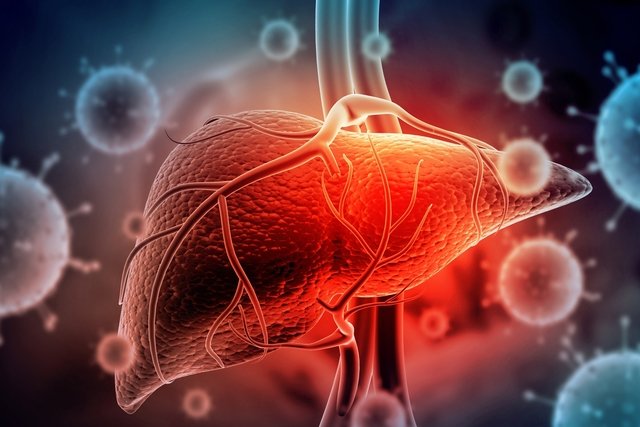Hepatitis A is an infectious disease caused by the hepatitis A virus (HAV), which causes inflammation of the liver and can lead to the appearance of some symptoms such as tiredness, low fever, headache and abdominal pain, for example.
Infection with the hepatitis A virus occurs mainly through the consumption of contaminated water and food and, therefore, is more common in places where hygiene and sanitation conditions are more precarious.
The symptoms of hepatitis A usually disappear on their own after a few days, however, for faster recovery, it is important that the person rests, drinks plenty of fluids and eats lightly.

Main symptoms
The main symptoms of hepatitis A are:
- Excessive tiredness;
- Headache;
- Nausea and vomiting;
- Low fever;
- Stomach ache;
- Yellow skin and eyes;
- Dark urine and light stools.
Most cases of hepatitis A do not cause the appearance of signs or symptoms, being noticed only after routine tests to assess liver function. However, symptoms may take between 15 to 40 days after infection with the virus to begin to appear.
In more serious cases, in which liver damage occurs, symptoms can be more serious, such as high fever, pain in the abdomen, repeated vomiting and very yellow skin. These symptoms are most often indicative of fulminant hepatitis, in which the liver stops functioning. The progression of hepatitis A to fulminant hepatitis is rare, occurring in less than 1% of cases. Learn about other symptoms of hepatitis A.
Read too: Fulminant hepatitis: what it is, symptoms, causes and treatment
Online symptom test
To find out your risk of having hepatitis A, select the symptoms you may be experiencing from the test below:
The symptom test is only a guidance tool and does not serve as a diagnosis or replace consultation with a hepatologist, gastroenterologist or general practitioner.
How the diagnosis is made
The diagnosis of hepatitis A must be made by a general practitioner or hepatologist by evaluating the signs and symptoms presented, as well as by carrying out tests that help identify the presence of antibodies against the virus, which is indicative that HAV is circulating in the body, and tests that evaluate the functioning of the liver, such as TGO and TGP, which are normally altered in cases of hepatitis. See more about tests that evaluate the liver.
Make an appointment with your nearest doctor to evaluate your liver, confirm the diagnosis and start the most appropriate treatment, if necessary:
Taking care of your health has never been easier!
Transmission of hepatitis A
The main route of transmission of hepatitis A is via the fecal-oral route, that is, through the consumption of food and water contaminated by the feces of people carrying the virus. Therefore, when food is prepared under poor hygiene conditions there is a greater risk of contracting the disease.
Additionally, swimming in water contaminated by sewage or eating infected seafood can also increase the chance of infection with the hepatitis A virus.
How the treatment is carried out
As in most cases, infection with the hepatitis A virus is not considered serious, treatment is carried out only with medications to alleviate symptoms, such as painkillers and anti-nausea medicines, in addition to recommending that the person rest and drink plenty of water to hydrate and help the cup recover.
Symptoms usually disappear within 10 days, and the person recovers completely within 2 months. Therefore, during this period, if you live with someone who has this disease, you should use sodium hypochlorite or bleach to wash the bathroom, to reduce the risk of being contaminated. See more details about the treatment of hepatitis A.
During the treatment period, it is also important to have a healthy diet, preferably based on vegetables, as this will help the recovery process. Check out the video below for some tips on what to eat in case of hepatitis:
What to do to prevent
To prevent infection with the hepatitis A virus, it is important to adopt some measures, such as:
- Get the hepatitis A vaccinewhich is available on the SUS for children aged 1 to 2 years or privately for other ages;
- Wash hands after going to the bathroom, changing diapers or before preparing food;
- Cook food well before eating them, especially seafood;
- Wash personal itemssuch as cutlery, plates, cups and baby bottles;
- Do not swim in contaminated water or play near these places;
- Always drink filtered water or boiled.
The people most likely to become infected with this disease are those who live in or travel to places with poor hygiene and little or no basic sanitation, as well as children and people who live in crowded environments, such as daycare centers and nursing homes.



